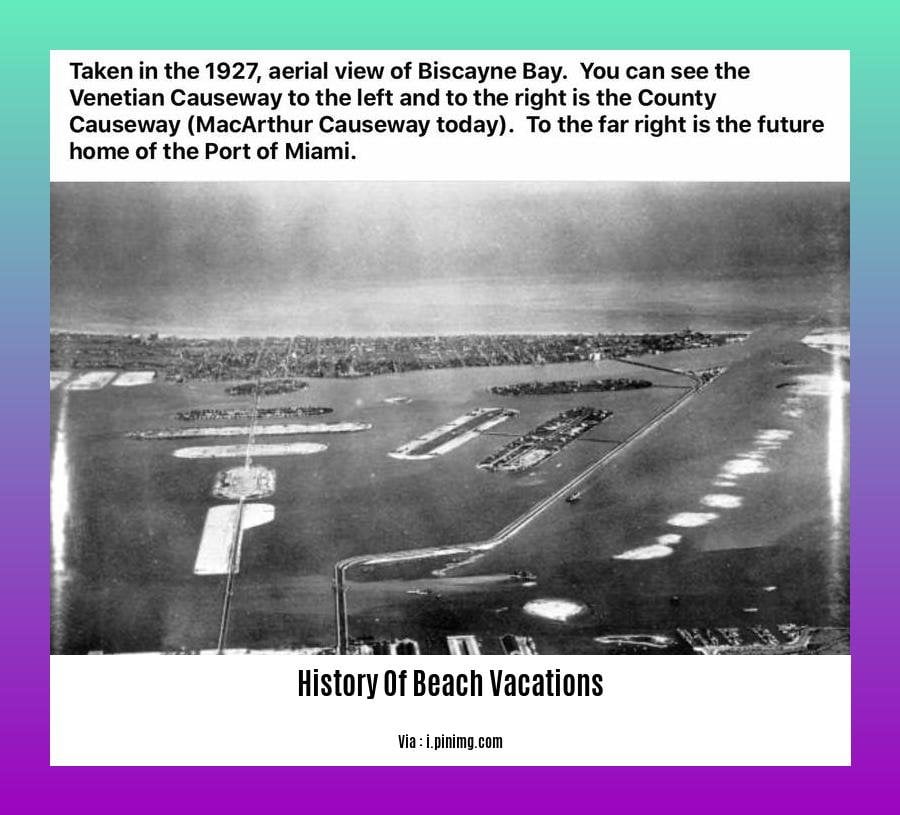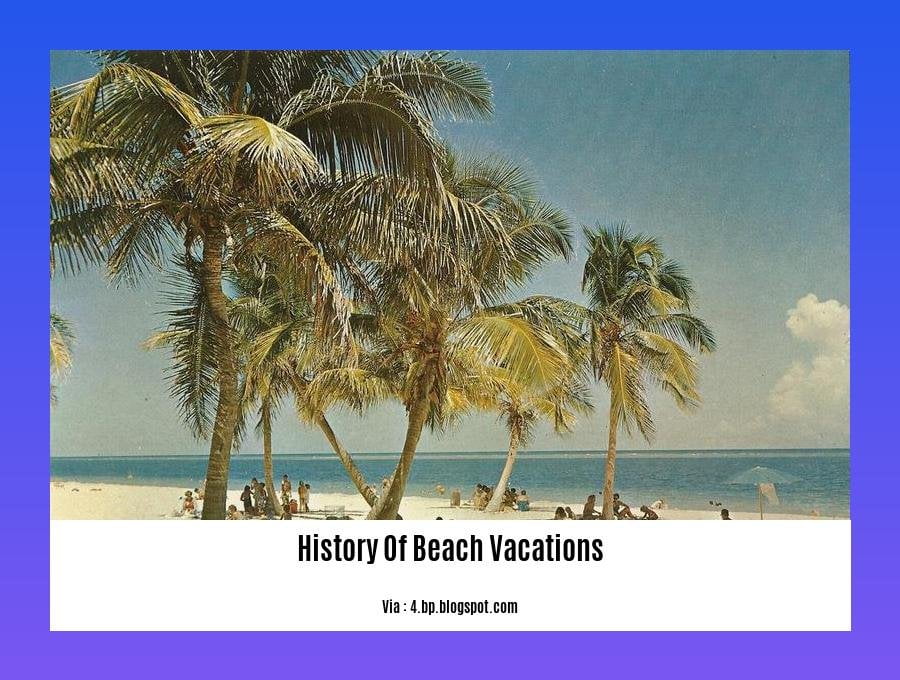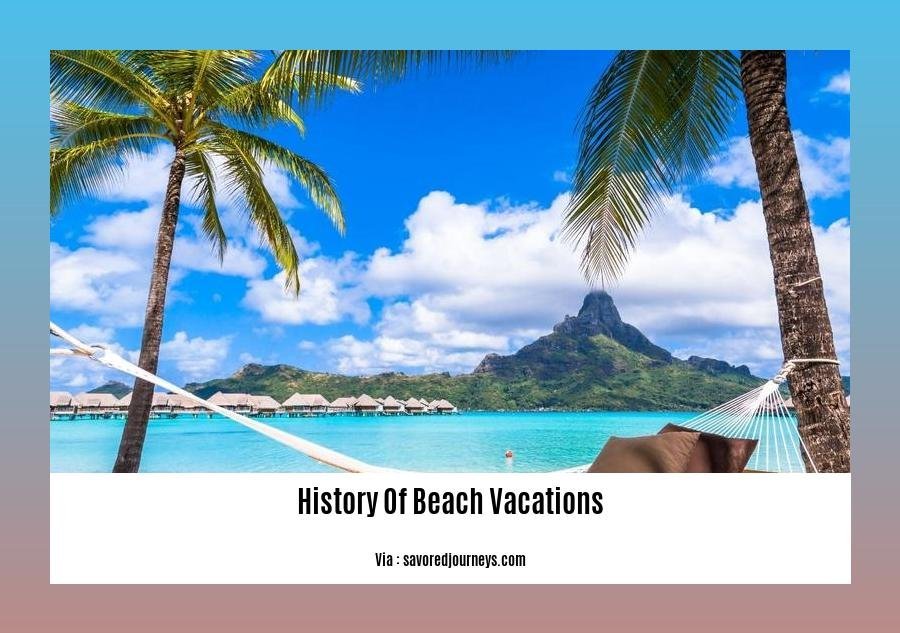Embark on a captivating journey through [- The History of Beach Vacations: From Royal Retreats to Mass Escapes]. Discover how seaside sanctuaries have evolved from exclusive havens for the elite to accessible escapes for the masses, shaping the cultural landscape of leisure and leaving an enduring mark on human history.
Key Takeaways:
- In the past, beaches were seen as dangerous and uninviting.
- The 18th century saw the rise of coastal retreats due to their healing properties.
- Romantic literature and art popularized the allure of beaches in the 19th century.
- Improved transportation and leisure time made beach vacations accessible to all in the early 20th century.
- The mid-20th century witnessed a boom in beach activities and the establishment of resorts.
History Of Beach Vacations

From Royal Retreats to Mass Escapes
Once deemed dangerous and unhealthy, beaches have transformed into beloved vacation destinations. Let’s dive into the fascinating History Of Beach Vacations:
Pre-18th Century: A Fearful Reputation
Beaches were once seen as perilous places, with strong currents and rough waves posing threats. Moreover, they were associated with poor health, as people believed sea air could cause illnesses.
18th Century: Sea-Bathing for Health
In the 18th century, British physicians began extolling the virtues of sea-bathing. They claimed it could cure various ailments, making beaches more popular among the elite.
19th Century: Beaches as Romantic Escapes
Romantic writers and artists romanticized beaches as idyllic retreats. They depicted them as places of relaxation and contemplation, fostering a new appreciation for seaside beauty.
Early 20th Century: Mass Accessibility
Advancements in transportation and increased leisure time made beach vacations accessible to the general public. As people flocked to coastal destinations, beach towns and resorts flourished.
Mid-20th Century: Boom of Leisure Activities
Beaches became synonymous with leisure and recreation. The development of surfing, volleyball, and other activities transformed them into hubs of entertainment and excitement.
Today: A Global Phenomenon
Beach vacations have become a global phenomenon, with people traveling far and wide to experience the joys of sun, sand, and sea. They continue to play a vital role in promoting relaxation, adventure, and cultural exchange.
Over time, our relationship with beaches has evolved vastly, from a place of fear to a sought-after destination for rejuvenation and leisure. Today, beach vacations serve as a testament to the captivating power of nature and its enduring allure.
Discover the captivating History of Vacations, from its humble beginnings to its present-day significance. Delve into the origins of Vacation Bible School, where children experience the joy of faith-filled summer camps. Learn about the evolution of Vacation Rentals, tracing their growth from simple cottages to luxurious vacation homes. Explore the History of Vacations in the United States, examining how paid time off transformed the American lifestyle. Uncover the fascinating History of Summer Vacation, tracing its roots back to ancient Greece and its impact on education. Embark on a journey through the History of Summer Vacation from School, understanding how school holidays came to be and their impact on learning. Explore the History of Disney Vacation Club, discovering the magic behind the company’s exclusive vacation ownership program. Dive into the History of Paid Vacation, examining how workers fought for the right to time off and its transformative impact on society. Learn about the fascinating History of Bluegreen Vacations, tracing the growth of one of the nation’s leading vacation rental companies. Experience the evolution of Summer Vacations in America, from seaside getaways to adventurous road trips. Unravel the History of the Word Vacation, tracing its etymological journey and its enduring significance in our lives.
Innovations in Transportation and Tourism

Key Takeaways:
- Beach tourism emerged as a British export during the Industrial Revolution.
- *Innovations in Transportation and Tourism* such as railways and steamships made beach resorts more accessible to tourists.**
- Health resorts played a significant role in the development of beach tourism.
- Social characteristics, architectural designs, and landscape designs influenced beach resorts.
- Advancements in technology have continuously shaped the evolution of the beach tourism industry.
Beach tourism emerged as a British export during the Industrial Revolution. With advancements in transportation such as steam-powered ships, wealthier individuals and families began seeking leisure time at seaside destinations. These early beachgoers were primarily motivated by health concerns, as sea bathing was believed to have therapeutic benefits.
Health resorts became popular during this period, offering a combination of medical treatments and leisure activities. These resorts were often designed with elaborate architectural styles and landscape designs that catered to the tastes of the wealthy elite. The presence of these resorts helped to establish beach vacations as a desirable and fashionable pastime.
Innovations in Transportation and Tourism
The development of railways and steamships played a significant role in making beach resorts more accessible to the general public. These advancements in transportation allowed people from inland areas to travel to coastal destinations more quickly and conveniently. As a result, beach vacations became increasingly popular with the middle class and working class.
In addition to transportation innovations, the rise of paid vacations and the growth of the leisure industry contributed to the increasing popularity of beach vacations. As more people had the time and resources to travel for pleasure, beach resorts became a popular destination for relaxation and recreation.
Today, beach vacations remain a popular form of tourism around the world. Technological advancements continue to shape the industry, with the rise of online booking platforms, mobile apps, and wearable devices. These innovations have made it easier for travelers to plan and book their beach vacations, as well as to access information and services while on their trips.
Sources:
- Smithsonian Magazine: Inventing the Beach: The Unnatural History of a Natural Place
- ResearchGate: Beach Tourism
Beach Culture and Lifestyle
Beaches have always been a place of leisure and recreation. The ancient Romans built villas along the coast. In the 18th century, wealthy Europeans began taking seaside vacations to escape the heat and pollution of the city. By the early 20th century, beach vacations had become a popular pastime for people of all ages.
Key:
- Early Origins: Beaches have been a destination for leisure and recreation since ancient times.
- Beach Tourism: The concept of beach tourism emerged in the early 19th century with people flocking to coastal areas for leisure activities.
- Health and Wellness: Beach resorts became popular in the late 19th century as a place for people to improve their health and well-being.
- Cultural Evolution: Beach culture has evolved over time, reflecting changes in fashion, music, and other cultural trends.
- Economic Impact: Beach tourism is a significant industry that contributes to local economies worldwide.
Relevant URL Sources
Modern Beach Tourism
Imagine a time when beaches were considered dangerous and bathing in saltwater was a medical prescription. Fast forward to today, where beach vacations are a global phenomenon, attracting millions seeking relaxation, adventure, and cultural exchange. This evolution is a fascinating tale of cultural shifts, technological advancements, and the enduring allure of the seaside.
Rise of Seaside Resorts: With the onset of industrialization, cities became crowded and polluted, leading to a yearning for escape and rejuvenation. In the 18th century, British physicians prescribed sea-bathing for its therapeutic benefits, giving rise to seaside resorts.
Transportation Revolution: The advent of railways and steamships made beach destinations more accessible to the masses, transforming beach vacations from an exclusive pastime to a popular leisure activity.
Artistic Influence: Romantic artists and writers painted beaches as idyllic havens, inspiring a widespread fascination with the seaside. Their depictions of sun-drenched shores, crashing waves, and sandy coves further fueled the desire to experience the magic of coastal escapes.
Cultural Symbolism: Beaches became synonymous with freedom, relaxation, and leisure. The iconic image of beach umbrellas, deck chairs, and seaside strolls has evolved into a symbol of the modern vacation experience.
Key Takeaways:
- Modern Beach Tourism emerged as a product of industrialization and the desire for relaxation.
- Seaside resorts played a pivotal role in the development of beach tourism.
- Transportation advancements democratized beach vacations, making them accessible to a broader audience.
- Romantic art and literature shaped the perception of beaches as idyllic retreats.
- Beach vacations have become a cultural symbol of freedom and relaxation.
Relevant URL Sources:
- Smithsonian Magazine: Inventing the Beach
- Wikipedia: Beachgoing
FAQ
Q1: When did beach vacations become popular?
A1: Beach vacations began gaining popularity in the 18th century among British elite seeking health benefits from sea-bathing, and continued to rise in popularity throughout the 19th century with the rise of romanticism and the development of mass transportation.
Q2: What were the key factors that contributed to the development of beach tourism?
A2: Health recommendations, urbanization, increased leisure time, advancements in transportation, and the romanticization of beaches by artists and writers were key factors that contributed to the development of beach tourism.
Q3: How did beach culture evolve over time?
A3: Beach culture has evolved alongside societal changes, reflecting shifts in fashion, music, and other cultural trends. It has transformed from a health-oriented pursuit to a symbol of leisure, relaxation, and personal freedom.
Q4: What is the economic impact of beach tourism?
A4: Beach tourism is a significant industry that contributes to local economies around the world, providing employment opportunities, boosting infrastructure development, and generating revenue through tourism-related spending.
Q5: How have technological advancements influenced beach tourism?
A5: Technological advancements, such as improvements in transportation and communication, have made beach destinations more accessible and affordable, while also shaping the development of beach activities like surfing and water sports.
- Unlocking Francis Alexander Shields’ Finance Empire: A Comprehensive Biography - July 12, 2025
- Unveiling Francis Alexander Shields: A Business Legacy - July 12, 2025
- Francis Alexander Shields’ Business Career: A Comprehensive Overview - July 12, 2025















